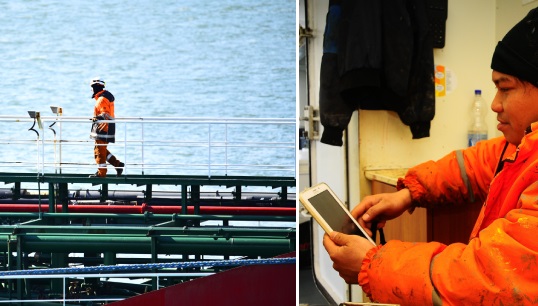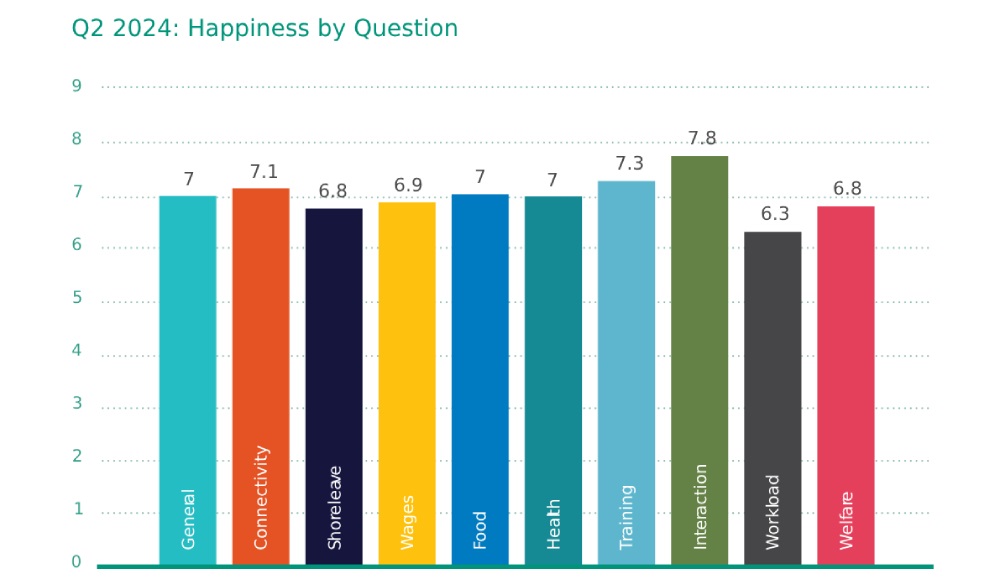
Seafarers who either work on tankers, or on vessels with good crew connectivity are likely to be happier than their poorly-connected counterparts, according to the Q2 2024 Seafarers Happiness Index (SHI).
This 'two-speed industry' – showing a divide on both digital communications and readiness for new fuels – is outlined in The Mission for Seafarers 2024 Q2 SHI report.
Vessel type can significantly affect the well-being of seafarers, with seafarers on tankers feeling well-prepared, qualified, and ready to tackle the challenge of new fuels. In striking contrast, those on dry cargo and container vessels feel left out of crucial technologies and developments emerging in the industry.
Those serving on vessels with up-to-date communications technology also comment on how this is transforming the social and emotional landscape of life at sea, as it is critical for maintaining links to home.
However, for those who do not have those means of communication, life onboard can be challenging; many are facing limited data, slow connections or no access at all. This likely reflects the fact that although recent updates to the Maritime Labour Convention (MLC) gave mandatory social connectivity for crew, shipowners and governments may seek to charge for it, although charges are supposed to be 'reasonable'.
Feedback from seafarers taking part in the latest quarterly survey also showed some upticks in positivity among seafarers, but these modest shifts in wellbeing were mostly dependent on areas where there were any improvements in shore leave, wages, training, crew interaction, and workload.
This quarter also registered a higher female participation rate at 15%, up from 9% in the first quarter of 2024. Although the data indicates improvements across several areas, there remains room for improvement in satisfaction levels for connectivity, health and fitness.
Mission to Seafarers secretary-general Andrew Wright said: 'Although there are still plenty of areas of growth that need attention, our report reveals an encouraging trajectory of steady recovery and stabilisation after what has been a tumultuous year for seafarers. However, reports of a distinction between the ‘haves and have-nots’ of welfare standards onboard are worrying. Every single seafarer deserves access to the fundamentals that are needed to support a safe and rewarding life at sea, including access to shore leave, decent connectivity, good onboard facilities, and regular training.'
- read the full Seafarers Happiness Index report for Q2 2024.
Satisfaction at sea: what's going up and down?
The 2024 Q2 SHI report showed a nuanced view of seafarer satisfaction on the scoring system it uses: the joy of camaraderie among seafarers being tempered by the pain of long separations from family, as well as inequalities across connectivity, training, shore leave and food quality. The following figures compare the second quarter of 2024 (April-June) with the first quarter (January to March).

A graphic from the Seafarers Happiness Index Q2 2024 report shows the disparity on Connectivity and Training questions. Image: SHI
Going up
- general happiness 7 up from 6.86
- shore leave 6.76 up from 6.56
- wages 6.88 up from 6.81
- training 7.28 up from 7.23 – haves and have nots apparent, particularly in new fuels readiness
- interaction with crew 7.75 up from 7.68
- workload 6.32 up from 6.11
- access to welfare facilities 6.8 up from 6.58
Going down
- contact with family 7.14 down from 7.22
- food 7.03 down from 7.23
- ability to keep fit and healthy 6.99 down from 7.18
- contact with family 7.14 down from 7.22
- food 7.03 down from 7.23
- ability to keep fit and healthy 6.99 down from 7.18
Training seafarers for net-zero fuels & maritime regulations
As the IMO aims to reach net-zero by 2050, the shipping industry is quickly adopting new, alternative fuels to run more sustainably. Nautilus International head of professional and technical David Appleton has spoken to NautilusTV about about the importance of training seafarers on the safe-handling and operation of vessels powered by alternative fuels, and how international and national maritime regulators are developing training requirements.
Tags

